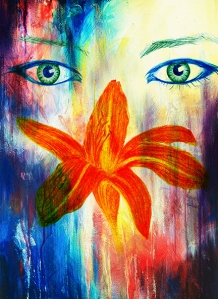“Every man has his secret sorrows which the world knows not; and often times we call a man cold when he is only sad.”
― Henry Wadsworth Longfellow
Our face is a mask, sometimes opaque, sometimes transparent.
Recently a friend of mine was taking an online test about reading emotions, and not doing too well. She was frustrated. I suspect the test was flawed in multiple ways, and even if she did read the emotions correctly, there’s never any way to be certain of the reason for the feelings. We can’t read minds, and we don’t know all that is happening in anyone’s life.
Someone may smile at something we said because it ties in with a conversation they had only a moment before. We’re unaware of what was said, however, and think they’re smiling inappropriately at our tale, and become frustrated. It happens everyday.
That’s a simple misunderstanding. Just as we don’t know what is spoken in the moments before we join a discussion, we most often have no way of fully knowing what’s happening in the lives of those around us. People are discreet enough generally to keep their private lives private, and sometimes they do so almost to a fault.
I have a friend who was dealing with her mother’s Alzheimer’s last year, and I never knew until shortly before her mom died. She and I had been working on a project together and I’d wondered why she’d lost her enthusiasm for it. Was it something I said? Had I been too controlling? I can get stuck in my ways. Now, that could have been the case, but more likely, she simply had other priorities.
She kept up a brave face around me, and maybe wondered why I never asked how her mom was doing. You see, others knew. I didn’t. Perhaps I should have known. We live in a communication age, but our own personal interactions frequently suffer from presumptions and assumptions all around. We rely too much on expectations and, as I alluded to above, expressions of emotion.
How we view our peers and others around us is more than just reading facial expressions, of course.
As well as how they view us. We’re born with a look that defines us, or helps others think they can define us. We grow and mature and that look changes and develops with us, but never truly reflects all that we are. It limits our definition of ourselves to other people.
When I was in high school, I peripherally was friends with a young woman, a year older than I, who to this day I’d have to say was the most beautiful woman I’ve ever met. Another woman in my group described her by saying, “she looks like a cover girl, only she hasn’t been airbrushed.” The only person to come close to matching her beauty (and it may be a tie) was her younger sister.

But beauty had its price. Let me add here these were two of the nicest, most sincere women you’d ever meet as well, and their parents were great people. Yet despite all the kindness they’d show to others, they were subject to vicious rumors and gossip simply because of petty jealousy. They faced other problems directly related to their looks, such as expectations from men when they were far too young to handle that sort of thing, and so on. It wasn’t fair.
The older girl, my friend, was often cautious around other people, knowing what they would be saying as soon as she left the room. That in turn led to talk she was “stuck-up” because she’d be reluctant to open up to someone new, or even those she knew well enough already.
We make judgments sometimes to feel in control of a situation. If we understand what’s going on, we can deal with it, so we seek an answer — and run the risk of being horribly wrong.
How do we discern a person’s heart?
Respecting another’s privacy is an important value to many of us, and in doing so, we also must respect we will likely give up some knowledge we may find useful, whether we have a right to it or not. That knowledge includes the ability, at times, to fully understand someone’s painful history and appreciate their distant behavior as a symptom of that aching within themselves.
I do believe we should, in general, live with an attitude every person is far more complex than we can recognize when we first meet them. Giving someone the benefit of the doubt, understanding we don’t know what secret sorrows they face, is the gracious thing to do.
Having that open mind and open heart, giving others a chance to reveal themselves, will help teach us the perception and insight we seek. It is immensely rewarding to be the one who discovers the cold and bitter outsider is a warm, kind person waiting to be loved.
Yes, we must always use discretion when reaching out to others to save ourselves from being taken advantage of by manipulative and greedy people. A slow and steady approach of grace with the counsel of others is always wise.
Grace, wisdom, warmth of spirit. Gifts of human kindness that can change the world.

Image Credits: (Masks) © tereks — Fotolia; (Face) © jozefklopacka — Fotolia; (Flowers) © nongkran-ch — Fotolia


Your post is so relevant, Belinda. One thing that I’ve adopted as a mantra is not to take things personally. You’ve basically described why in this post. So much unnecessary pain in my life has been caused by interpreting other people’s actions in a way that caused me to believe it was related to something I did or said. It is so freeing to let go of that!
You write so beautifully. Your examples are helpful and something everyone can relate to. Your posts always hold my interest and I appreciate you very much!
LikeLiked by 1 person
Thank you, Judy. Yes, not taking things personally is so important. I always appreciate your feedback!
LikeLiked by 1 person